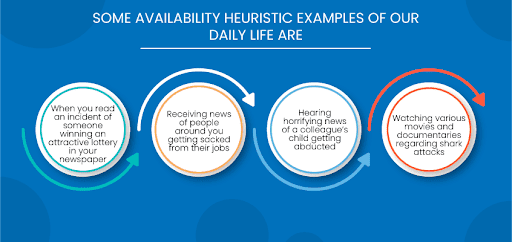Introduction
While trying to decide, you might surprisingly find that you suddenly got reminded of several related incidents or situations. It is known as the availability heuristic, which allows you to quickly judge a problem based on past similar events and arrive at a conclusion.
For example, after receiving several bad reviews about food quality and its effect on people, you might judge that all the food restaurants in your area also serve bad quality food.
What is the Availability Heuristic?
The availability heuristic refers to your tendency to use information that comes to your mind quickly and efficiently when faced with a decision-making opportunity about the future. The availability heuristic suggests that any singular, memorable moments can have an outsized influence on your future decisions.
Availability heuristic happens unconsciously to you, suggested that when a particular incident comes easily to your mind, without any effort than other incidents, you will believe that such incidents are more common than the others.
The availability heuristic is valuable and handy to you, but it can also lead to problems or errors. For example, news of car accidents, bank robberies, road accidents, rail accidents, etc., may often make you believe that those events are much more common than they indeed are.
Studies suggest that when you get highly involved with a particular event, you will remember that incident more often than other insignificant events. It will also make you feel that such an incident will happen to you. Commonly, some incidents tend to stand out more than others in our minds.

What is an availability heuristic example to make decisions?
Some availability heuristic examples of our daily life are:
- When you read an incident of someone winning an attractive lottery in your newspaper, you start to overthink your chance of winning a jackpot. It leads you to spend your hard-earned money every week buying lottery tickets. Such incidents may not favour you, where you start spending your cash uncontrollably.
- Receiving news of people surrounding you sacking from their jobs makes you start believing that you may also get fired from your job, just like others. It makes you feel upset. You can’t sleep properly at night, as you continuously think that tomorrow is your last day at the job.
- After hearing horrifying news of a kid abduction from one of your colleagues, you think these horrible incidents are widespread. You then begin to refuse your child from playing outside by themselves and never allow them to leave out of your sight at any cost.
- Watching various movies and documentaries regarding shark attacks, you may start to believe that shark attacks are widespread in general. So, next time you are on vacation in the sea. You don’t go swimming, thinking about the possibility of getting attacked by a shark.
What is the psychology of availability heuristic to make decisions?
So, if you are wondering why your mind takes these shortcuts to make any decisions, remember that availability heuristic psychology lets you take these shortcuts to aid decision-making. If information is more easily accessible, it becomes more efficient for you to use it and decide.
How well you can recall any incident depends on how recently it happened and how much it has impacted you. Therefore, it is easier to make any of your decisions based on recent events rather than depending on something long ago.
The mere exposure effect
The term mere exposure effect means that you are more likely to admire something if you get more exposure. For example, if you grew up listening to classics, you will enjoy specific kinds of music, like classics.
Due to such a mere exposure effect, people use the availability heuristic to make decisions quickly. Higher exposure to specific incidents means you will be more likely to think about that incident when faced with a decision-making situation.
How do you use the availability heuristic to make decisions?
Generally, when making decisions, you have the best intentions in mind. You will consider everything you know and then make a well-thought decision to guarantee the best possible result.
However, you may find it difficult when you want to be objective. Perception of any incident can easily skew your decision-making process and cloud your judgment. It happens due to the availability heuristic.
When you use the availability heuristic to make decisions, your mind prioritises infrequent events based on recency and vividness. Such as, although news of plane crashes can make you afraid of flying. The probability of you dying in a car accident is far higher in reality.
Conclusion
Availability heuristics is the cognitive bias of making decisions based on memories you can easily recall. Some memories leave a lasting impression on your life as they trigger specific emotional triggers. It is needless to say. Heuristics play an essential role in your daily life and how you make decisions or act upon the information.
The availability heuristic can be a beneficial tool. But you must remember that it can lead to specific incorrect assessments of your life. Deciding on a whim may not always be favourable to you.
Be aware that just because you remember something more vividly in your mind. It does not necessarily mean it is more natural or more likely to happen to you. With the help of a trained team of mental health professionals at United We Care, you can rely upon numerous tools and decision-making strategies for a positive outcome while making a decision.









